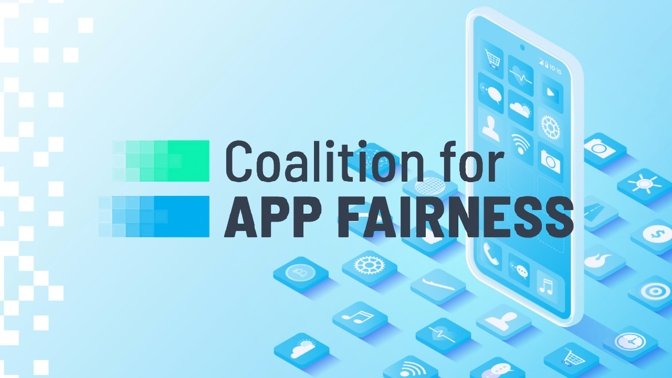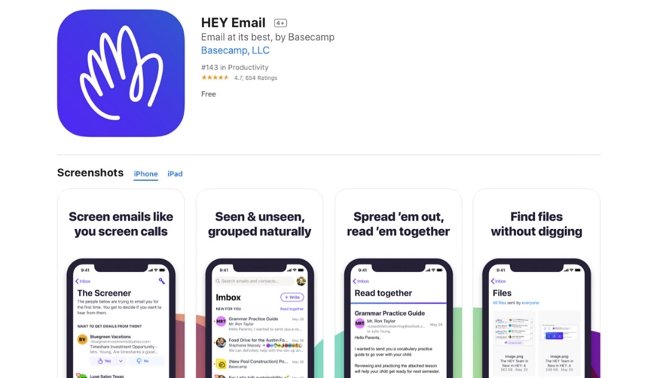Coalition for App Fairness wants iOS app distribution to work like Windows
The Coalition for App Fairness wants a more open iOS platform with a better review process, outside payments, and app distribution similar to Windows.

The Coalition for App Fairness wants to take on App Store policies
Apple has been under heavy scrutiny by app developers for its App Store policies. The Coalition's main concerns are seemingly random or unreasonable app submission denials, scam apps earning millions of dollars, and a marketplace built to help only top earners.
The Coalition for App Fairness (CAF) is made up of over 50 members consisting of app developers and companies that have petitioned Apple to improve conditions for app development and distribution. Four members of the Coalition spoke out during a short press conference on Monday to reaffirm their goals before a Wednesday hearing.
The press conference consisted of:
Apple's rejection of the Hey email app in 2020 sparked the creation of the CAF
Hansson's company Basecamp was in a lengthy battle with Apple in early 2020 over a new app called "Hey." Apple allowed the app onto the App Store at first, then later rejected it based on its business model. Basecamp did not want to share 30% of its revenue with Apple and fought back, ultimately finding a compromise with the company.
Hey is now available on the App Store due to adding a trial email client within the app so that users wouldn't have a unusable app at download. Basecamp is unable to advertise its subscription from within the app, and users must discover the service on their own.
The Basecamp issue was a prelude to the battle Apple had with Epic Games over Fortnite. Hansson uses Epic's lawsuit as a talking point when discussing issues with the App Store and the need for alternate distribution methods.
Kosta Eleftheriou is an iOS developer and creator of the app FlickType for Apple Watch. He is entwined in his own lawsuit against Apple, claiming the company uses its monopoly position to control what apps a user can download -- sometimes to Apple's competitive advantage.

This children's app is actually a casino game grossing millions of dollars
Eleftheriou says that the App Store review process is broken and allows scam apps through while making it hard for legitimate developers. He has been surfacing multiple scam apps that bring in millions in revenue to prove his point.
Derrick Morton is the third developer to speak out on the call. He is a game developer with years of experience and a number of apps on the App Store. He states that the App Store makes competition impossible for many developers due to how apps are shared.
Morton claims that the App Store places top earners at the forefront and leaves smaller developers to fend for themselves. The ability to find games that are not in the top 100 is minuscule at best, he says.
These claims have been heard in some form or another over the past year. Apple has taken steps to make the App Store better for developers, but the CAF says its efforts are nowhere near enough.
The question and answer portion was short and sweet, with little to no new information about the CAF's position. The first question asked if the issues presented were also a problem for Google developers, and the simple answer was yes.
The CAF hopes that they can use Apple as an example of what's happening in these closed ecosystems to have legislation passed. Sweeping laws affecting software distribution, monetization, and user control would affect many companies beyond Apple.

Epic Games wants to offer in-game currency without paying Apple a cut
Another question addressed payment processing and Apple's requirements surrounding it. It inquired whether the CAF would be satisfied with a rule change allowing apps to use alternate payment methods outside of Apple's.
Hansson simply answered no. To expand, Morton said that the change would be welcome, but added that the damage is well beyond just alternate payment methods at this point. Without alternate app stores, Apple could deny a developer their business at any time.
The members pointed out the existence of platforms like macOS and Windows. Users can access apps via the web and download them without going through a dedicated store.
Eleftheriou pointed out that App Notarization could be used on iOS, similar to how it is used on macOS to enable web distribution of apps. Alternative app stores wouldn't even need to exist for this to work.
Hansson says that Windows is the best example of a free and open marketplace for digital consumers. There, platforms like Steam, Epic, and the Windows Store all compete on equal ground for consumer attention. On top of that competitiveness, developers have the choice to distribute software on any or all of these stores. When considering Windows, developers need not fear their app idea being denied by a monopoly power. Their app can exist in a multitude of ways.
On Wednesday, the CAF will have its first hearing with the Senate Judiciary Subcommittee on Competition Policy, Antitrust, and Consumer Rights. There they will make their case against Apple and begin the long process of pushing for new competition laws that will affect Apple, Google, Amazon, and others in the tech space.
Stay on top of all Apple news right from your HomePod. Say, "Hey, Siri, play AppleInsider," and you'll get the latest AppleInsider Podcast. Or ask your HomePod mini for "AppleInsider Daily" instead and you'll hear a fast update direct from our news team. And, if you're interested in Apple-centric home automation, say "Hey, Siri, play HomeKit Insider," and you'll be listening to our newest specialized podcast in moments.

The Coalition for App Fairness wants to take on App Store policies
Apple has been under heavy scrutiny by app developers for its App Store policies. The Coalition's main concerns are seemingly random or unreasonable app submission denials, scam apps earning millions of dollars, and a marketplace built to help only top earners.
The Coalition for App Fairness (CAF) is made up of over 50 members consisting of app developers and companies that have petitioned Apple to improve conditions for app development and distribution. Four members of the Coalition spoke out during a short press conference on Monday to reaffirm their goals before a Wednesday hearing.
The press conference consisted of:
- Meghan DiMuzio, Executive Director of CAF
- David Heinemeier Hansson, Founder and CTO of Basecamp
- Derrick Morton, Founder and CEO of FlowPlay
- Kosta Eleftheriou, Founder of FlickType

Apple's rejection of the Hey email app in 2020 sparked the creation of the CAF
Hansson's company Basecamp was in a lengthy battle with Apple in early 2020 over a new app called "Hey." Apple allowed the app onto the App Store at first, then later rejected it based on its business model. Basecamp did not want to share 30% of its revenue with Apple and fought back, ultimately finding a compromise with the company.
Hey is now available on the App Store due to adding a trial email client within the app so that users wouldn't have a unusable app at download. Basecamp is unable to advertise its subscription from within the app, and users must discover the service on their own.
The Basecamp issue was a prelude to the battle Apple had with Epic Games over Fortnite. Hansson uses Epic's lawsuit as a talking point when discussing issues with the App Store and the need for alternate distribution methods.
Kosta Eleftheriou is an iOS developer and creator of the app FlickType for Apple Watch. He is entwined in his own lawsuit against Apple, claiming the company uses its monopoly position to control what apps a user can download -- sometimes to Apple's competitive advantage.

This children's app is actually a casino game grossing millions of dollars
Eleftheriou says that the App Store review process is broken and allows scam apps through while making it hard for legitimate developers. He has been surfacing multiple scam apps that bring in millions in revenue to prove his point.
Derrick Morton is the third developer to speak out on the call. He is a game developer with years of experience and a number of apps on the App Store. He states that the App Store makes competition impossible for many developers due to how apps are shared.
Morton claims that the App Store places top earners at the forefront and leaves smaller developers to fend for themselves. The ability to find games that are not in the top 100 is minuscule at best, he says.
These claims have been heard in some form or another over the past year. Apple has taken steps to make the App Store better for developers, but the CAF says its efforts are nowhere near enough.
The question and answer portion was short and sweet, with little to no new information about the CAF's position. The first question asked if the issues presented were also a problem for Google developers, and the simple answer was yes.
The CAF hopes that they can use Apple as an example of what's happening in these closed ecosystems to have legislation passed. Sweeping laws affecting software distribution, monetization, and user control would affect many companies beyond Apple.

Epic Games wants to offer in-game currency without paying Apple a cut
Another question addressed payment processing and Apple's requirements surrounding it. It inquired whether the CAF would be satisfied with a rule change allowing apps to use alternate payment methods outside of Apple's.
Hansson simply answered no. To expand, Morton said that the change would be welcome, but added that the damage is well beyond just alternate payment methods at this point. Without alternate app stores, Apple could deny a developer their business at any time.
The members pointed out the existence of platforms like macOS and Windows. Users can access apps via the web and download them without going through a dedicated store.
Eleftheriou pointed out that App Notarization could be used on iOS, similar to how it is used on macOS to enable web distribution of apps. Alternative app stores wouldn't even need to exist for this to work.
Hansson says that Windows is the best example of a free and open marketplace for digital consumers. There, platforms like Steam, Epic, and the Windows Store all compete on equal ground for consumer attention. On top of that competitiveness, developers have the choice to distribute software on any or all of these stores. When considering Windows, developers need not fear their app idea being denied by a monopoly power. Their app can exist in a multitude of ways.
On Wednesday, the CAF will have its first hearing with the Senate Judiciary Subcommittee on Competition Policy, Antitrust, and Consumer Rights. There they will make their case against Apple and begin the long process of pushing for new competition laws that will affect Apple, Google, Amazon, and others in the tech space.
Stay on top of all Apple news right from your HomePod. Say, "Hey, Siri, play AppleInsider," and you'll get the latest AppleInsider Podcast. Or ask your HomePod mini for "AppleInsider Daily" instead and you'll hear a fast update direct from our news team. And, if you're interested in Apple-centric home automation, say "Hey, Siri, play HomeKit Insider," and you'll be listening to our newest specialized podcast in moments.

Comments
Really just Google Play, side loading Android Apps, and iOS; choose wisely.
Appstores in the Apple ecosystem are needed wrt security and privacy, and Epic, Spotify and Schibsted are anyhing but vulnerable victims.
Apple certainly knows how to extract juicy profit. So does Epic, Spotify and Schibsted. Schibsted have vast information about their news and flee market customers, and Spotify was one of the early friends of Facebook. They have collaborated for many many years.
I have opted out of solutions like Setapp. The reason is that I believe that my privacy is under less threat by sticking to Appstore and that privacy will improve inside Appstore. Outside: Not very likely.
CAF may very well criticise crooks and crapps in Appstore, but that would be far worse outside.
Government exists to use force to compel people to do things which they otherwise would not, such as paying taxes. Democratic government exists to use this power in furtherance of the public interest, such as by providing public schooling. Arguing about what is in the public's interest is important.
I do agree with:
I think a lot of the other points are just self serving to the developers at the expense of adding complexity to consumers. I don't like the idea that they are trying to change Apple's ecosystem into an open one, it was never conceived as one. Apple should be allowed to create a "game console" like experience for phones and tablets where only blessed apps run on it and on Apple's terms. If developers don't like it they can freely develop for Android. If consumers don't like it, they can freely buy Android phones. Let the market decide.
It's clear a lot of these developers either ignore or underplay that Apple spends billions each year to create new hardware, software and services to maintain the attractiveness of the ecosystem to consumers who then buy and use their apps. To say Apple does nothing for their 15% is ridiculous and beyond belief. Most of CAF is self serving, made up of well known, mainly big developers. It's not a true consumer group and the amount of government intervention they are asking for is worrying and could have unintended consequences. It's also uncomfortable that they single out the App Store when half their issues also apply to Google Play Store. If they were being "fair" they should be addressing both stores but instead they focus on the one where they make the most money.
Apple app stores could certainly need a spring clean too, but they are not as bad as the others. Would have appreciated that the app proposals were better aligned to my preferences. It should be pretty obvious to "iOS/appstore" that I never will purchase any of the games they are showing off.
I DO appreciate not having to look outside the App Store very often. Great advantage.
This is not the same thing however. This is equivalent of some company demanding federal legislation to force Target and Walmart to sell particular brands. Even further it’s them demanding that the government step in and mandate how apple’s business run, not because apple is doing anything wrong, but because these companies don’t want to play by the rules. Look at what MS did today with their gaming platform. XBox Cloud will now run on iOS devices. They faced the same limitation, and solved the problem. The group that is taking things to Congress though doesn’t want to solve the problem. They want to use the government to use its big stick to beat Apple into submission.
What they are doing is deceptive, disingenuous, against free enterprise, and wrong. wrong on so many levels there isn’t space to cover them all here.
Perfect.
If you thought you were entitled to Apple's money and services you might not think it was so absolutely ridiculous.
iOS on the other hand is on 23% of the World's mobile devices and given away for free to anyone using an iDevice.
And I have a question for those CAF members saying that iOS users would benefit from the added competition of having more than one app store or ways to install apps. If this is true, then why do the apps on Android cost the same as the similar apps on iOS? Why haven't more competition brought down the cost of apps on Android? Oh, yeah .... it has. The pirated apps on the internet are dirt cheap.
https://en.wikipedia.org/wiki/List_of_Android_app_stores
https://www.nytimes.com/2020/09/28/technology/google-play-store-30-percent.html
>Google has argued that it allows other companies to operate app stores within its Android software. On Monday, the company said it would make changes in next year’s version of Android to make it easier to use other app stores on its devices without compromising safety.
In the post, Google used Epic as an example of an app developer benefiting from Android’s third-party app stores — noting the availability of Fortnite on Epic and Samsung’s app stores. But Epic, in its complaint, said Google held a monopoly over app distribution, because more than 90 percent of app downloads on Android devices come through the Google Play Store.<
The bottom line seems to be that these members of CAF just don't want to pay the 30% to be in the Apple App Store or Google Play Store, but they still want to be in those app stores. They would probably lose money if they were listed in a third party app store. Specially if Google or Apple were to make it so that apps in their app stores can not be listed in another third party app store or available over the internet.
These CAF members don't care about lowering the price of their apps for the consumers, due to more competition. That would entail them losing money. They want more competition to force Apple and Google to lowering their commission, so they could make even more money.